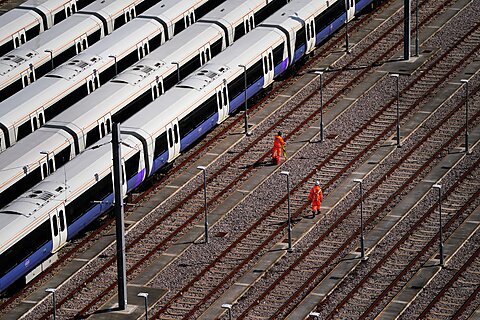Marc Joffe
Two recent developments reinforce the case against new, large government‐run rail projects. These initiatives are usually a bad deal for taxpayers given their high and unpredictable costs, long construction cycles, and disappointing ridership.
First, Prime Minister Rishi Sunak radically downsized Britain’s ambitious HS2 high‐speed rail project intended to connect Central London with Manchester in the north of England. Estimated costs had ballooned to £106 billion (or $129 billion at the recent exchange rate).
HS2’s northern terminus will now be at Birmingham, limiting the project which was originally expected to include 335 miles of track, to just 140 miles. And the first six miles between London Euston and Old Oak Common in the London suburbs will only be built if private funding can be found.
Sunak announced his decision at the Conservative Party conference on October 4, telling attendees:
HS2 is the ultimate example of the old consensus. The result is a project whose costs have more than doubled, which has been repeatedly delayed and it is not scheduled to reach here in Manchester for almost two decades… and for which the economic case has massively weakened with the changes to business travel post‐Covid. I say, to those who backed the project in the first place, the facts have changed. And the right thing to do when the facts change, is to have the courage to change direction. So I am ending this long‐running saga. I am cancelling the rest of the HS2 project.
Much the same can be said of California’s high‐speed rail project. As I discussed here previously, estimated project costs have roughly tripled since it was originally sold to voters in 2008 and the completion date will be at least a decade later than the original expectation of 2020. And, with California population not growing in accordance with projections, the high‐speed rail authority has reduced its ridership forecasts.
Perhaps California Governor Gavin Newsom can take a page from Prime Minister Sunak by truncating his own high‐speed rail project. Newsom indicated such an intention in his 2019 State of the State speech, but rapidly backtracked after facing criticism from project advocates.
Meanwhile, in Northern California residents have been absorbing the latest bad news about one of its own rail‐based white elephants. The six‐mile extension of the Bay Area Rapid Transit (BART) system through downtown San Jose received a new price tag and delivery date.
The construction cost estimate was raised from $9.3 billion to $12.2 billion (or roughly $2 billion per mile), and revenue service is now not expected until 2036.
The new completion date is one year after Californians will be prohibited from buying cars with internal combustion engines. As I wrote previously, the extension will replace very few car trips and a large proportion of those theoretically would have been in electric vehicles. As a result, the BART project is an extremely inefficient way of battling climate change.
Local leaders have generally supported the BART extension despite its poor cost/benefit profile, but perhaps now someone in power will call for a reappraisal. As with high‐speed rail, the project has strong support from advocates and special interests. It remains to be seen whether any California official will stand up to the train lobby and take the side of the state’s beleaguered taxpayers.
























